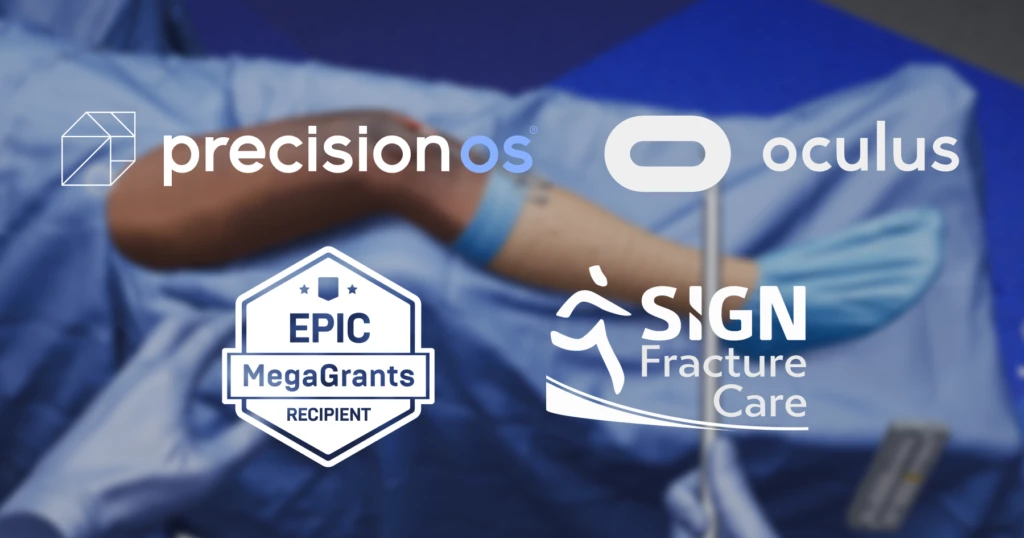SEATTLE, WA August 18, 2021. PrecisionOS®, with support from Oculus and an Epic MegaGrant from Epic Games, is providing SIGN Fracture Care, a global nonprofit humanitarian organization, with training for doctors doing orthopedic surgery in low-resource countries, vastly improving outcomes for patients with severe bone fractures and bone injuries.
Epic Games provided financial assistance through Epic MegaGrants, aiding in the development of the Unreal Engine-powered VR training solution; Facebook donated Oculus Quest 2 Headsets; and PrecisionOS created a training module specific to the needs of, which focuses on improving orthopedic fracture care.
PrecisionOS supplies immersive VR training for orthopedic surgeons for multiple medical device companies, professional societies and major medical institutions worldwide. The cutting-edge module for SIGN Fracture Care will help doctors in low- resource hospitals improve their cognitive understanding of joints and bone structures and develop psychomotor skills before performing treatments on patients, far more training than is presently available in the 55 developing countries served by SIGN Fracture Care. Previously, SIGN Fracture Care needed to fly surgeons to their headquarters or to a hospital in another country for training, using precious funding.
“Educating local surgeons to render care for patients in their home communities builds much-needed sustainable orthopedic capacity and improves the quality of life and longevity for people in low- and middle-income countries,” explained Lewis Zirkle, M.D, SIGN President and Founder “With PrecisionOS freeing resources up, we can move more rapidly towards our goal of creating equality of fracture care around the globe.”
SIGN Fracture Care will also be able to use the PrecisionOS® system to monitor and track surgeon progress.
PrecisionOS’s training modules are the only VR training programs for surgeons built around the proven learning theory: Deliberate Practice. The modules permit individual decision making, allowing the trainee try different approaches to the procedure and giving them performance and technical feedback until they are totally comfortable performing the procedure – not just having them do rote practice, a critical differentiation from competitive solutions.
“The Deliberate Practice approach to surgeon education has decades of research demonstrating its effectiveness. When surgeons are allowed to try alternate approaches, make mistakes and offered challenges, the learning is most effective and provides better retention, that is the core foundation of PrecisionOS® simulation software,” explains Danny Goel, MD, Surgeon and CEO of PrecisionOS.
“PrecisionOS’ is demonstrating that VR training can be less expensive and more accessible than traditional alternatives.” said Sebastien Loze, Simulation Industry Manager, Epic Games. “We’re thrilled to support this initiative through Epic MegaGrants, and to see Unreal Engine used for the betterment of those in need.”
SIGN Fracture Care’s efforts have been recognized by the US Department of Defense, which awarded Dr. Zirkle with its Medal for Distinguished Public Service.
About SIGN FractureCare
SIGN Fracture Care has been empowering local surgeons to treat patients in developing countries for 22 years. Our model is to provide orthopedic education to surgeons in developing countries, then donate appropriate instruments and implants so they can treat patients with severe fractures. SIGN Fracture Care has helped more than 350,000 patients in 55 developing countries recover from broken bones and traumatic injuries. To learn more, visit www.signfracturecare.org.
About PrecisionOS
PrecisionOS was founded by clinical orthopedic surgeons in partnership with senior software developers to create the most effective VR-based training for orthopedic surgeons. Our immersive simulations are scientifically validated, peer-reviewed and have been published in leading medical research journals. Participants engage in a realistic operating environment, alone or in collaboration with other trainees anywhere in the world, test their knowledge and desire to try alternate approaches, receive instructive feedback and repeat procedures until achieving proficiency.


